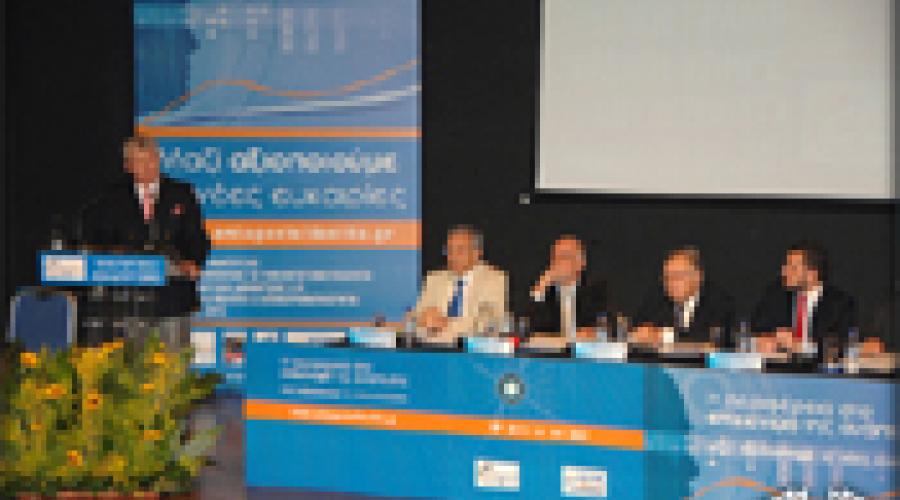
The results of informing and consulting the local authorities in the country?s regions on the new Operational Programme ?Competition and Enterprise? (EPAN II) for 2007-2013 were recently presented at an event of the Special Secretariat for Competition of the Ministry for Development in Athens, with the presence of the Minister for Development, Mr. Ch. Folias.
In her opening speech, Commissioner D. Hubner stressed that in making use of EPAN, Greece will become more competitive on a European and international level and that the EU will contribute to the better implementation of the programme.
According to Mr. Folias, the utilization of approximately 40 billion EURO of the National Strategic Reference Framework 2007-2013 will contribute to the reinforcement of Greek economy and the substantial convergence of the Regions. The Minister noted that ?the developmental vision for the country is the advancement of viable entrepreneurial initiatives of quality, embodied knowledge and innovation with an extroverted direction towards markets with high purchasing power and demands.?
EPAN ΙΙ has four Priority Axes for the period 2007-2013:
- The creation and exploitation of innovation, on the basis of research and technological development: National Research and Development Poles, Regional Innovation Poles, innovative partner clusters in cutting-edge sectors, enterprises with high-intensity knowledge, the cooperation of production and research bodies, small and medium-sized business networks for the provision of technological services, etc.
- Reinforcement of entrepreneurship and extroversion: reinforcement of enterprises in the processing, tourism, trade, culture sectors, as well as in under-represented social groups (youth, women, etc). The upgrading of products and services to achieve added value, environmental awareness and to incorporate knowledge and innovation.
- Improvement of the enterprise environment: simplification of the regulatory framework, the development of a common network system of structures, support of incubated enterprises, improvement of structures in tourism, exploitation of natural and cultural reserves, consumer protection, upgrading of market monitoring mechanisms, etc.
- Integration of the energy system: energy supply with the use of natural gas, completion and modernization of the electricity network, penetration of renewable energy resources and correct management of natural resources.
It is worth noting that EPAN I reinforced more than 12 300 enterprises related to processing, tourism, trade and provision of services in terms of integrating investment plans, supporting competitiveness, EMAS certification and application of quality assurance systems. The challenges for specific groups were reinforced (youth, women, persons with special needs, Roma, parents with more than one child) while structures such as the Credit Guarantee Fund for Small and Very Small Enterprises (TEMPME SA), 13 Centres for Business and Technological Development (KETA) at regional seats, and 53 investor reception centres (KYE) in the prefectural seats of the country were established. To this day, 82 274 persons have participated in training programmes for medium-sized businesses which, in Greece, amount to approximately 800 000 and correspond to two-thirds of job positions in the private sector.
The Deputy Minister for Development, Mr. S. Kalafatis, while presenting the results of EPAN I in the sectors of Industry, Energy, Research and Technology, mentioned among other things that more than 3 500 research projects and 1000 enterprises had been funded. He added that 8 private incubators had been established, offering high-intensity knowledge services, that the first Technological Partner Cluster had been formed in micro-electronics, and that 5 Regional Innovation Poles, academic and research centres had been upgraded. Furthermore, 2 400 scientists, researchers and business employees had been trained in advanced technology.
According to Mr. Kalafatis, Innovation is not only connected with new technologies but with production and development on the whole. With regard to entrepreneurship, the simplification of bureaucracy is necessary as is the promotion of new and modern dimensions, such as green enterprises, Corporate Social Responsibility, etc.







